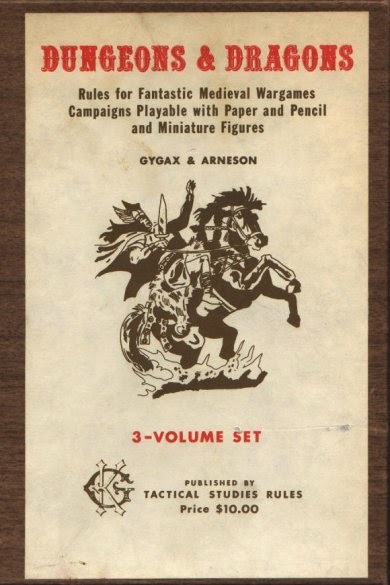There will be a basic set and it will be free.
Although I agree it is a game changer, I would limit its impact to WotC and the original DnD. That's to say it keeps WotC in the game, nothing more. I applaud those who championed this idea and those in WotC who bought it and made it happen. It's a great step in the right direction, but it isn't a game stopper for OSR by a long shot.
Offering a product for free is a great way to get people to try it, but it hardly adds value in itself.The real test will come in a few months. I'll be honest, I haven't been following up on the D&D Next development and I certainly didn't sign into their playtest due to their NDA policies. So I won't comment on the specifics as I don't know them. I will though express my thoughts based on what has been mentioned and some observations of old RPGs, which by providence I've stumbled upon recently and have had the opportunity to read..
Lets go back two years to the beginning of the playtest. To me the NDA seemed too draconian. It's about owning and not sharing. I give WotC an idea, great it's theirs, end of transmission. They'll pick from there and build on it. We can discuss this on end as it has been done before, but that to me talks about an owning WotC and not a sharing WotC. Not a very good thing to start building a community about sharing and building together.
Second point is what Mike Mearls has commented over and over again. They're building D&D based on all that which we like from previous versions. While a valid approach, I will base my comment on the wisdom of Abraham Wald who, during WWII, suggested armor be added on bombers where the airplanes got shot the least, not the most. They returned to base because they hadn't been hit in those critical spots. Based on this I have commented that WotC should build D&D on the weaknesses of previous versions and by fixing them turn them into strengths. A fix to that which I don't like about 1st and 2nd would make me buy Next, not a copy paste of what I already have. Did they? I don't know until I read the rules (see NDA above), and I hope they have.
Corporate red tape. WotC like it or not suffers from corporate inertia and lawyers. Many OSR publishers are not slowed down by this.They call the shots, publish and get things out quickly. Their ability to innovate and take risks is higher than WotC. Many will flop, but on the other hand many do succeed, and boy do they succeed. I see WotC as the old vertical, waterfall, software development paradigm while OSR is the more dynamic and agile release early and release often. WotC spend 2 years doing what? Once again without the NDA I don't know. There is though an interesting analogy with newspapers 'Paul Berry, who helped found the Huffington Post, eloquently describes the core problem with the way The New York Times views content creation: “At The New York Times, far too often for writers and editors the story is done when you hit publish. At Huffington Post, the article begins its life when you hit publish.”' (source). Take a look at all the WotC release hype and compare it to OSR products. The big unanswered question with WotC is what comes after launch, after they've hit "publish". Is that the goal, the end, or is it just the beginning?
Innovation. What new stuff does D&D Next bring to the table? I'm sure it fixes many things, but aren't these design flaws of the past and not really innovation. Would you consider a vehicle recall an innovation? Once again I'm talking off the top of my head because to know I'd have to sign an NDA I'm not willing to sign, and once again I'd love to be proven wrong. Looking at old wargames and RPGs as well as the history of the d20 made me value the work put into creating the roots of our hobby, but it also made me look at dice mechanics differently. Not as dogma, but at a solution to a problem present in that time. The dice mechanics we so cherish today solved many issues from long ago which many are unaware today. They were innovative in their time. Fast forward 40 years and I'd ask. Is d20 a valid model? If so are we innovating in its usage? Solving problems of the past in new ways? In what way is WotC breaking away from the mainstream as Gygax did 40 years ago when he made a brief comment about coloring half the sides of a d20 (which were at the time numbered 1 to 10 twice). To answer the why of doing this Gygax mentioned he was working on a new set of rules that made use of this. The rest as we all know is history. Is WotC making history or is it making a new edition?
So as great and groundbreaking as a free D&D Basic set may be, and I applaud those who pursued and managed to achieve this goal, it's a long shot from being a game stopper for OSR. IMHO there's still a lot of work in regards to community building, community participation and innovation. Things which may be hard for a big company like WotC are much easier for the smaller and more nimble OSR publishers. WotC is still competing with people who do this for the sport, and they're damn good at this sport. So free by itself may not be good enough.
Image Source
http://www.lyberty.com/encyc/articles/d_and_d.html

No comments:
Post a Comment